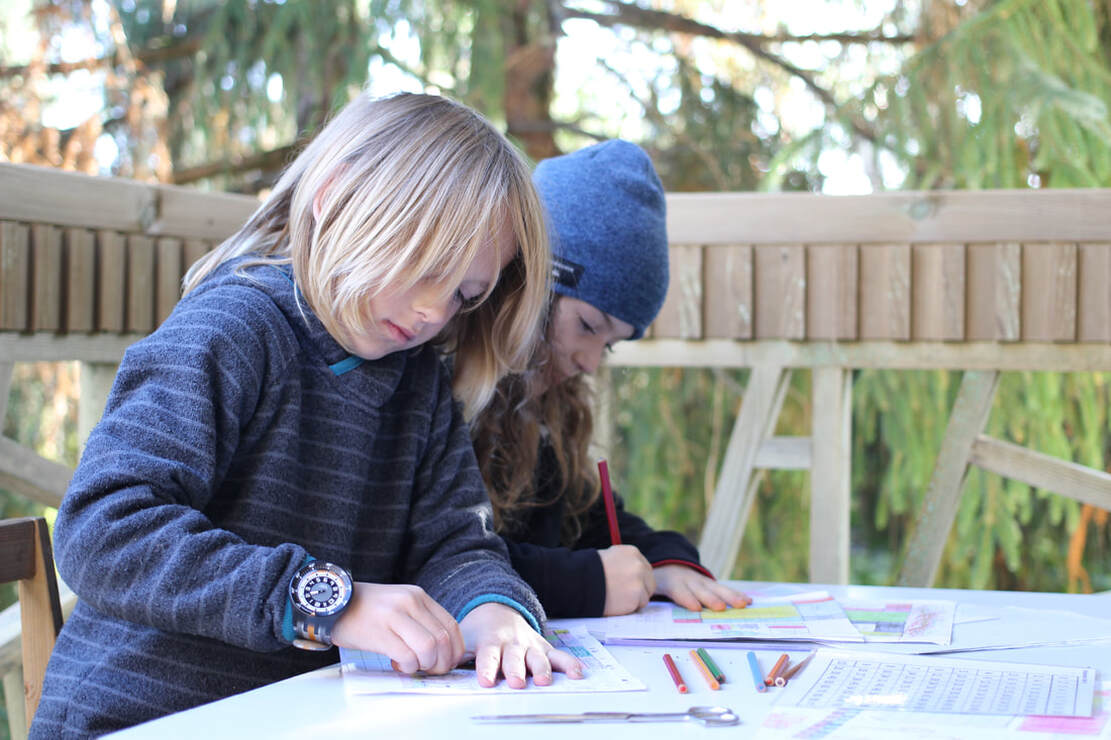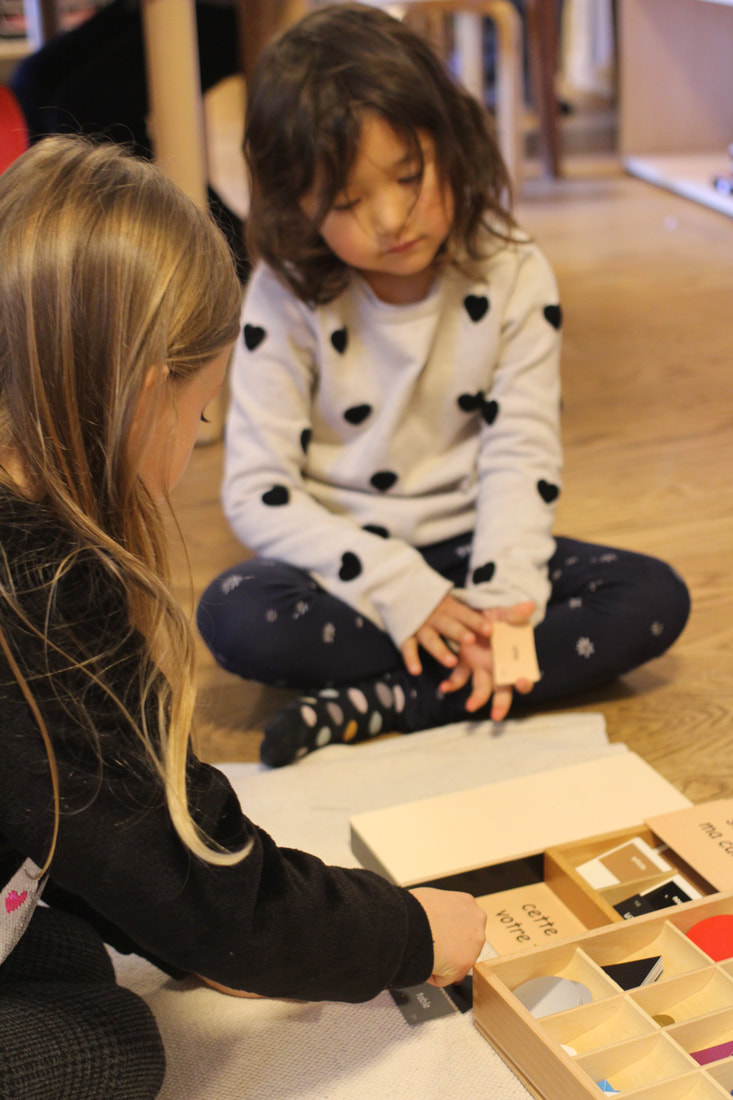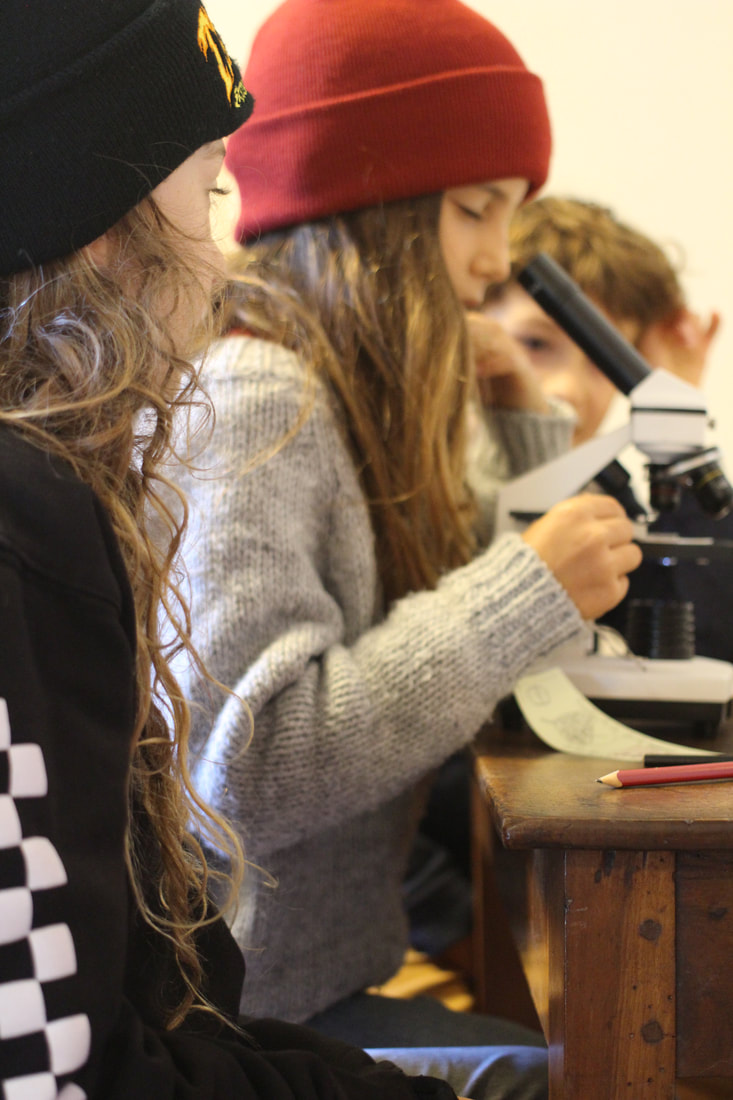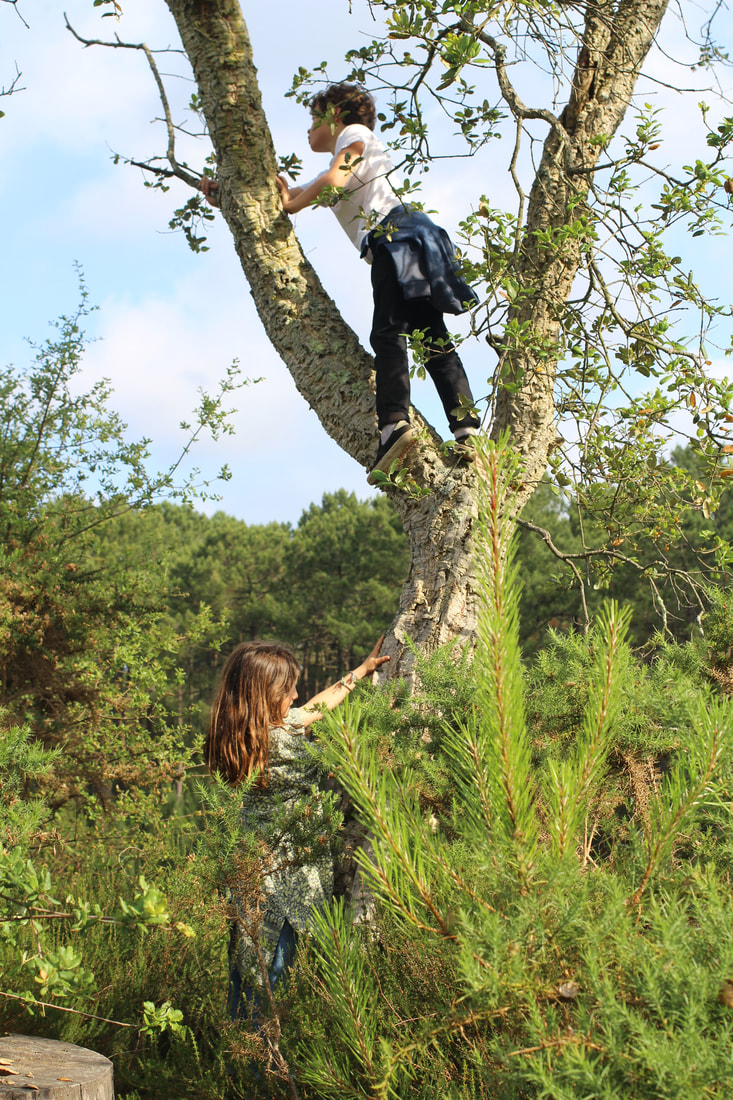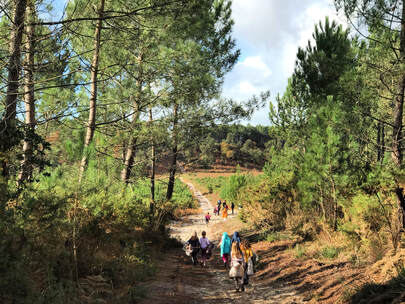The Elementary Classroom
6 - 12 YEARS
In the primary environment the child has built up his coordination of movements, order, concentration, and independence mainly through individual work. Now, in the Montessori Elementary Environment the child aged 6-12 begins his exploration of the world through group work. Montessori called the elementary child the “cosmic explorer” because of the child’s fascination with the exploration of the world. The elementary child uses his imagination to learn, imagining what he cannot see allowing him/her to study the grandeur of the universe. The traditional system is based upon the use of memory and abstraction instead of the faculty of reason. Reasoning allows the child to compare and deduce, ultimately arriving at a conclusion.
The Cosmic Explorer
|
Cosmic Education is the name given to the Montessori elementary program. The child must be afforded the grandeur of a whole view of the universe and the details must be seen in relation to the whole. Mario Montessori, described it this way, “we arrive at the history of mankind which, to be understood, must be inserted into the life of the earth and the universe.”
We begin this by presenting the whole through the five great stories. The first story deals with the creation of the universe (geology, geography, astronomy, physics, and chemistry). The second story is about the coming of life (paleontology, zoology, botany). The third story is about the coming of human beings (early man, civilizations, economic and political geography). And the fourth and fifth great stories are about the special creations of human beings, that of writing and numerals. After the stories the details are studied. As the child studies all the elements of the universe he begins to realize that there is a law and an order and an interconnectedness of all things. As the elementary child researches this interconnectedness he comes to a harmonious understanding of his planet. |
Building Character-Children build independence through freedom that has limitations.
-Children build self-confidence through group work and the opportunity to reflect on corrections needed in their work -Children are part of the learning process working with the guide to keep track of projects and discuss their individual needs and strategies -Children build self-motivation by following their own interest in the manifestation of child directed research projects -Children build cooperation with adults and peers in the environment where s/he must work in cooperation and resolve conflicts with peers. -Children build leadership skills by being given a chance to explore different facets of the world adjusted to their specific interests -Children build organization skills -Children build consideration and respect for others -Children explore their sense of justice by holding and managing responsible roles within the environment Subject AreasThe Elementary Environment can be divided into eight main subject areas: Mathematics, Language, Geometry, Biology, Geography, History, Art, and Music. By utilizing materialized abstractions the scientifically designed materials allow the child to move from a concrete understanding of an idea into an abstract conceptualization.
|
Self-Direction
|
Spelling in the Montessori approach
The Montessori approach does not use whole class dictations that are scheduled weekly or daily, prepared, and then tested to help children master spelling in either French or English.
We use a variety of lessons and strategies, which together contribute to the progressive and motivated mastery of spelling of a language spoken, used, read and written in the classroom. The words or the spelling rules that are memorized, will therefore vary from one child to another, regardless of age, as will the acquisition of the rest of the academic concepts in the classroom. The child is constantly learning, and not a day goes by without each child memorizing the spelling of a new word or a new spelling rule.
Here is a non-exhaustive list of lessons and strategies used to help each child master the correct spelling of French and English in the elementary classroom (6-12 years old, i.e. cycles 2 and 3).
Each technique/lesson is formally studied separately from the others, but then put into motivated practice as it is being used in the various writing tasks that the children are producing: in a research project report, in the creation of a story, etc...
The child corrects himself/herself during dictations or other independent exercises thanks to a correction model available.
Awareness of improvement and correction of spelling by the adult is gradually established through regular conferences with the child about his/her work.
In this environment, it is acceptable to misspell, provided that each individual works to improve and advance his or her spelling skills, which help to contribute to a finished production, which does not only contain quality content, but has now also achieved a high quality in its form.
We use a variety of lessons and strategies, which together contribute to the progressive and motivated mastery of spelling of a language spoken, used, read and written in the classroom. The words or the spelling rules that are memorized, will therefore vary from one child to another, regardless of age, as will the acquisition of the rest of the academic concepts in the classroom. The child is constantly learning, and not a day goes by without each child memorizing the spelling of a new word or a new spelling rule.
Here is a non-exhaustive list of lessons and strategies used to help each child master the correct spelling of French and English in the elementary classroom (6-12 years old, i.e. cycles 2 and 3).
- Reading: the more the child reads, the more the child is exposed to correct spelling
- Copy writing in relation to the child's various works: the more the child copies correctly spelled texts, the more he/she learns to spell the words he/she copies properly
- Spontaneous dictations between children and/or between adults and children: learning to spell a word for a classmate, or copying a word by writing on paper what another person dictates orally
- Focus on phonemes: word lists by phoneme
- Dictations in small groups, and by level (single words, two words, propositions, short sentences, multiple sentences, texts)
- Personal word lists and dictionaries
- Learning how to use the dictionary
- Spelling rules
- Work on word families and analogies
- Work on homophones
- Work on visual imagery: visual spelling, word decoration, use of color codes, etc.
- Work on punctuation
- Work on conjugation
- Etymology, work on Latin and Greek roots and suffixes
- Let's not forget parental involvement!
Each technique/lesson is formally studied separately from the others, but then put into motivated practice as it is being used in the various writing tasks that the children are producing: in a research project report, in the creation of a story, etc...
The child corrects himself/herself during dictations or other independent exercises thanks to a correction model available.
Awareness of improvement and correction of spelling by the adult is gradually established through regular conferences with the child about his/her work.
In this environment, it is acceptable to misspell, provided that each individual works to improve and advance his or her spelling skills, which help to contribute to a finished production, which does not only contain quality content, but has now also achieved a high quality in its form.
